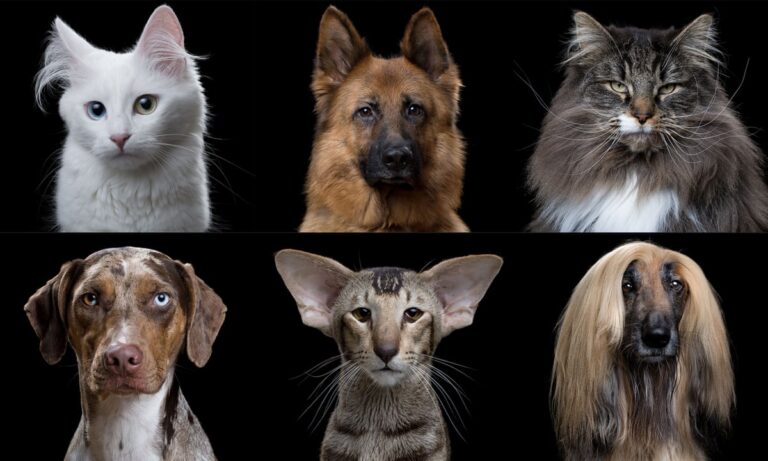No, dogs and cats cannot have a baby together because they are different species. The reproductive systems and genetics of dogs and cats are not compatible for reproduction.
While it is not possible for a dog and a cat to have offspring, they can form close bonds and live harmoniously in the same household. Many people choose to have both dogs and cats as pets, and with proper socialization and training, they can coexist peacefully.
Both dogs and cats offer unique companionship and bring joy to their owners’ lives. Understanding the distinctions between these two popular pets can help pet owners create a loving and cohesive environment for their furry friends.
/cdn.vox-cdn.com/uploads/chorus_image/image/72168536/GettyImages_1396828732__1_.0.jpg)
Credit: www.vox.com
Genetic Barriers In Mammalian Crossbreeding
When it comes to genetic barriers in mammalian crossbreeding, understanding species and genetic compatibility is crucial. The concept of speciation in biology plays a significant role in determining the reproductive compatibility between different species. Biological barriers such as differences in chromosome numbers and genetic incompatibility pose challenges to inter-species reproduction, affecting the likelihood of successful crossbreeding. Understanding these barriers is essential in evaluating the potential for hybridization between species and the viability of any resulting offspring.
Can A Dog And A Cat Have A Baby: Exploring Genetic Possibilities
When it comes to the question of whether a dog and a cat can have a baby, it’s important to explore the genetic possibilities and dispel the myths and misconceptions of inter-species breeding. From a scientific perspective, it’s crucial to understand the complexities of canine and feline DNA and the factors that prevent dogs and cats from crossbreeding.
The Role Of Chromosomes In Reproduction
Differences in dog and cat genetic makeup: Dogs and cats have different numbers of chromosomes, with dogs typically having 39 pairs and cats 19 pairs. This difference in genetic makeup can lead to chromosomal incompatibility between species, making it biologically impossible for a dog and cat to produce offspring together. The incompatible chromosomes in dogs and cats means that their reproductive systems are unable to produce viable offspring due to genetic disparities.
The Science Behind Successful Hybrid Animals
Hybridization, the process of combining different species to create a new organism, has fascinated scientists for decades. Examples of natural and artificial hybrid animals such as ligers and mules highlight the potential for diverse species to interbreed. However, the success of hybridization depends on various factors, including genetic compatibility and geographic proximity. While some species can hybridize due to similar genetic makeup, others cannot due to biological barriers. Human intervention has also played a significant role in encouraging animal hybridization, often crossing species for specific traits or characteristics. Understanding the science behind successful hybrid animals provides valuable insights into the potential and limitations of cross-species breeding.
Myth Busting: Dog-cat Hybrids In History And Culture
It has been a source of intrigue for centuries: whether dog-cat hybrids are real or simply mythical creatures of folklore and pop culture. Historical accounts and folklore often depict stories of such hybrids, blurring the lines between fact and fiction. While these tales are captivating, it’s important to distinguish between scientific and fictitious narratives. Contrary to popular beliefs, there are no authenticated scientific records supporting the existence of dog-cat hybrids. Despite their absence in the natural world, these mythical creatures have made their way into pop culture, appearing in various media, and captivating imaginations. The idea of a dog and a cat having a baby persists as a captivating concept in history and culture, perpetuating myths that continue to captivate the human imagination.
Ethical Considerations In Crossbreeding
Can a Dog And a Cat Have a Baby
The potential impact of attempting to cross species borders raises ethical dilemmas in genetic manipulation and animal welfare. The complexities of interbreeding different species can pose serious ethical challenges, involving the well-being and rights of the animals involved. Considering the future of genetic experiments with animals in a responsible framework, it is vital to carefully weigh the ethical implications and potential consequences of crossbreeding. Responsible consideration of the ethical dimensions of crossbreeding is essential to ensure the humane treatment and welfare of animals, while also respecting the integrity of species and ecosystems.
Frequently Asked Questions For Can A Dog And A Cat Have A Baby
Are Dogs And Cats Able To Mate And Have Offspring?
Yes, dogs and cats cannot mate and produce offspring as they are two entirely different species with different numbers of chromosomes.
What Are The Main Differences Between Dogs And Cats?
Dogs and cats have different mating behaviors, dietary needs, and social structures. Dogs are pack animals, while cats are solitary hunters.
Can A Dog And A Cat Live Together Peacefully In The Same Household?
Yes, with proper socialization, training, and supervision, dogs and cats can coexist peacefully within the same household. It’s essential to introduce them gradually and provide a safe space for each pet.
Conclusion
In sum, while dogs and cats cannot reproduce, they can form deep bonds and strong friendships. Their unique dynamic adds joy and love to many households. If you’re considering adding a furry friend to your family, consider the compatibility between these species.
Remember, every pet comes with its own unique personality and quirks, regardless of their breed.



